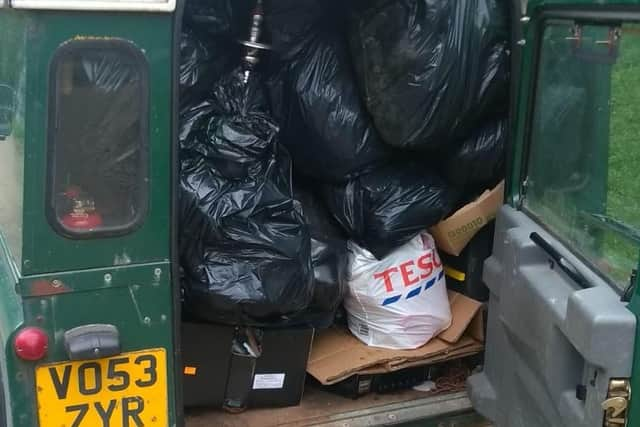Lake District rubbish dumping is 'overwhelming' as campers light fires, damage trees and litter
and live on Freeview channel 276
It has also led to vital resources being diverted away from conservation work to cleaning up the mess left behind, the charity added.
The National Trust is now urging people not to fly-camp on its land in order to help protect nature and wildlife.
Advertisement
Hide AdAdvertisement
Hide AdThe charity said that its ranger teams are now spending a fifth of their time clearing up after visitors rather than on conservation work.


Since the easing of lockdown restrictions in England, various tourist hot spots including the Peak District, Lake District and the west country have seen significant increases in the numbers of people camping, and a spike in the number of camper vans parking at beauty spots overnight, without permission.
- In Dovedale, in the Peak District, 170 large bin bags of rubbish were collected over just three days in June. Over the past few weeks 25 tents have been cleared together with 20 camping chairs, six air beds, several BBQs and a couple of camping tables.
- In the Lake District, the number of camper vans parking illegally is wiping out the capacity in many car parks for day visitors with 118 counted in just one evening at Buttermere. There are also unsustainable levels of anti-social fly-camping on accessible lake-shores with campers lighting fires, damaging trees and littering.
Advertisement
Hide AdAdvertisement
Hide Ad- In West Cornwall, 140 camper vans were turned away from 10 small remote sites over a week-long period - doubling or tripling what was normally expected.
Chris Millner, a ranger at Longshaw in the Peak District, said: "The volume of debris left behind is overwhelming and something we've not experienced before.
"After people have finished having fun it's like they abandon ship. What they couldn't be bothered to carry out they just left for someone else to clean up."
Steve Sudworth, a ranger for the north Cornish coastline, said: "The overnighters are frequently leaving human waste, used toilet tissue, BBQs and other litter across the beautiful countryside they have themselves come to enjoy.
Advertisement
Hide AdAdvertisement
Hide Ad"This is damaging these landscapes and spoiling them for everyone whilst causing a health hazard in already challenging times.
"We urge people to treat the countryside with respect, please only stay overnight at authorised sites, take your rubbish home with you when you visit and do not go to the toilet where there are no facilities."
The increase in campers and litter has led to more time being spent by National Trust ranger teams and volunteers clearing up after visitors, rather than on conservation work.
Rob Rhodes, head of rangers at the National Trust, added: "The sort of work we want to be doing at this time of year includes managing our flower rich meadows and caring for the wildlife that live there, and vital maintenance work to our network of paths and visitor routes.
Advertisement
Hide AdAdvertisement
Hide Ad"But this unsociable behaviour by some is taking up so much time that it's affecting not only on the upkeep of our sites but taking our staff away from vital conservation work and engaging with visitors.
"Leaving debris and litter behind can cause issues for wildlife such as injuring animals and destroying habitats."